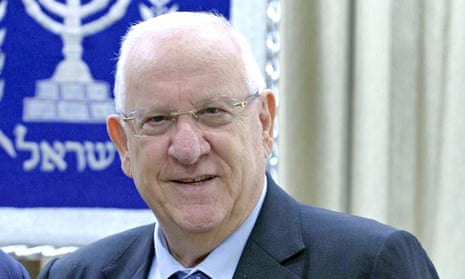Israel’s president, Reuven Rivlin, has voiced his strong opposition to a controversial proposed new law that would define “national rights” in Israel as reserved for Jews only.
The “Jewish nation-state” bill would recognise Israel’s Jewish character, institutionalise Jewish law as an inspiration for legislation and possibly de-list Arabic as a second official language. It is being promoted vigorously by the prime minister, Binyamin Netanyahu, and was approved by the Israeli cabinet on Sunday, but has attracted fierce criticism from opponents inside Israel as well as from the US and the EU.
Critics contend that the law – whose final form of words has yet to be settled and whose language seems likely to be softened – threatens to undermine Israel’s declaration of independence, which gives equal rights to the country’s minorities, including Israeli Arabs, by promoting the idea of Israel as a “Jewish state” above one that is “democratic”.
In an emotional critique of the proposed new legislation, which would become part of Israel’s basic laws , Rivlin said those who had drawn up Israel’s declaration of independence “in their great wisdom, insist that the Arab public in Israel not feel like the Jews felt in the diaspora”.
Speaking at a conference in the southern city of Eilat, Rivlin, a member of Netanyahu’s Likud party, asked: “What is the point of this bill?”
“Does this bill not in fact play into the hands of those who seek to slander us? Into the very hands of those who wish to show that even among us, there are those who see contradiction between our being a free people in our land, and the freedoms of the non-Jewish communities in our midst?
“The declaration of independence, in its depth and greatness, bound together two components of the state as Jewish and democratic, democratic and Jewish.”
For his part, Netanyahu has argued that individual civil rights would be guaranteed under existing laws for all, but that “national rights” should be reserved for Jews.
Rivlin’s comments came as the bill becomes mired in the fractious politics of Netanyahu’s increasingly divided coalition, with centrist parties threatening to vote against it when it comes before parliament next week.
It has also drawn the opposition of some on the right – like Rivlin, as well as commentators – who argue it is an unnecessary law that gives ammunition to Israel’s critics internationally.
On Wednesday, former defence and foreign minister Moshe Arens condemned the new legislation in a comment piece for Haaretz.
“We don’t need legislation to make Israel a Jewish state, and you cannot make it a Jewish state by legislation,” he writes.
“It is a Jewish state because the majority of the population is Jewish, because the dominant language spoken is Hebrew, because most of the books published here are Hebrew books, and most of the songs sung here are Hebrew songs … But most important, because of the Law of Return which enables any Jew, anywhere in the world, seeking refuge or desiring to live in Israel, to come here and become a citizen of the country.
“But not only is the proposed law unnecessary, it is harmful. A quarter of Israel’s population is not Jewish, and probably the most important item on the nation’s agenda should be their integration into the fabric of Israeli society and their participation in the Israeli economy. Giving them the feeling of being at home, of being equal citizens.”
Other critics of the new law include Jamal Zahalka, an Israeli Arab member of the Knesset, who has said it will make the state “less democratic and more racist”. The Palestinian president, Mahmoud Abbas, has described the law as a potential impediment to the peace process.
Rivlin’s intervention follows international warnings from the US and the EU.
A US state department spokesman said on Monday that it expected Israel to “continue [its] commitment to democratic principles”.
“The United States position, which is unchanged, has been clear for years – and the president and the secretary [of state] have also reiterated it – is that Israel is a Jewish and democratic state in which all citizens should enjoy equal rights.”







